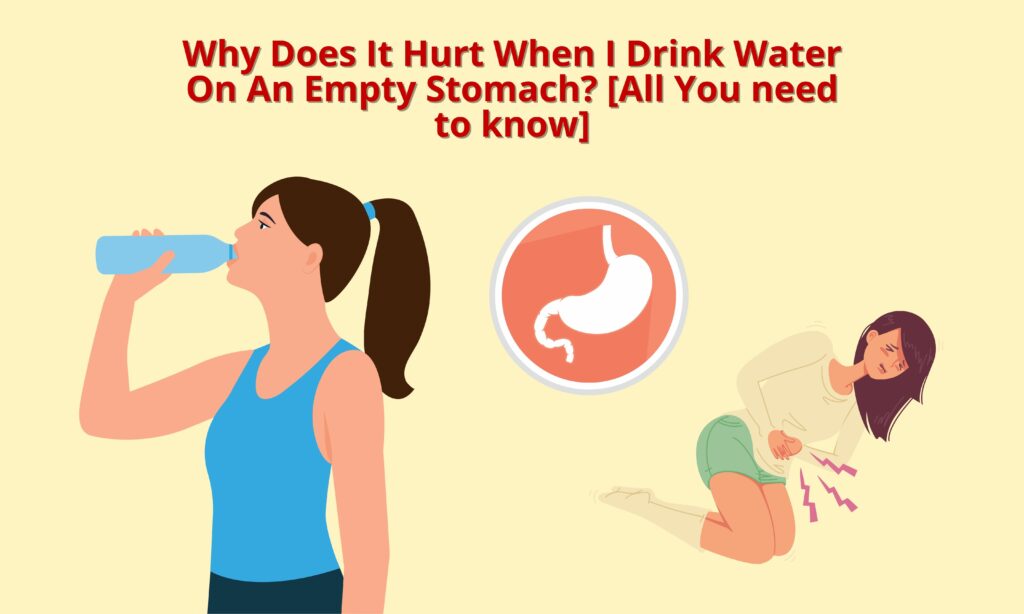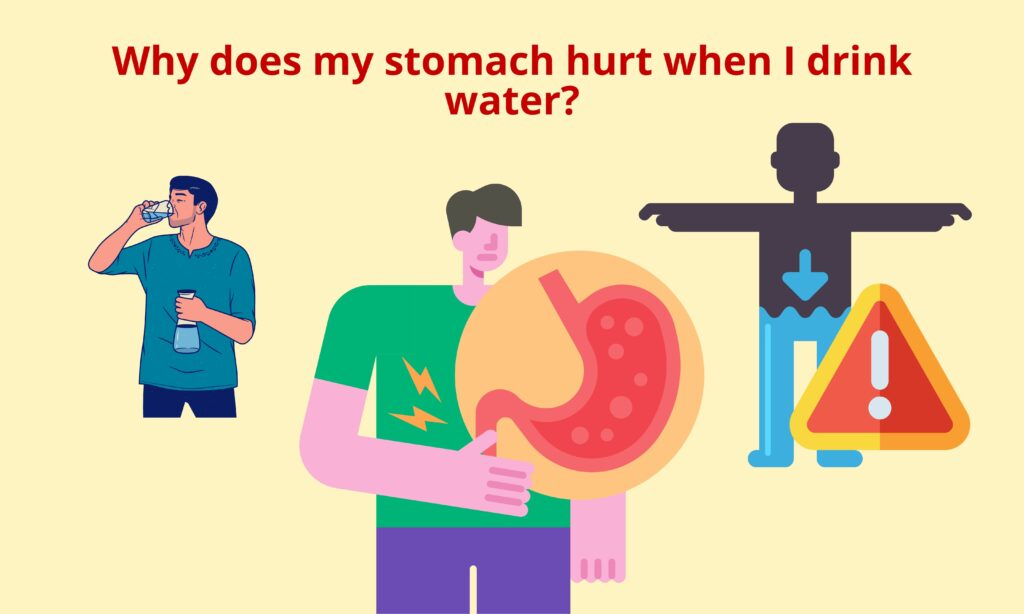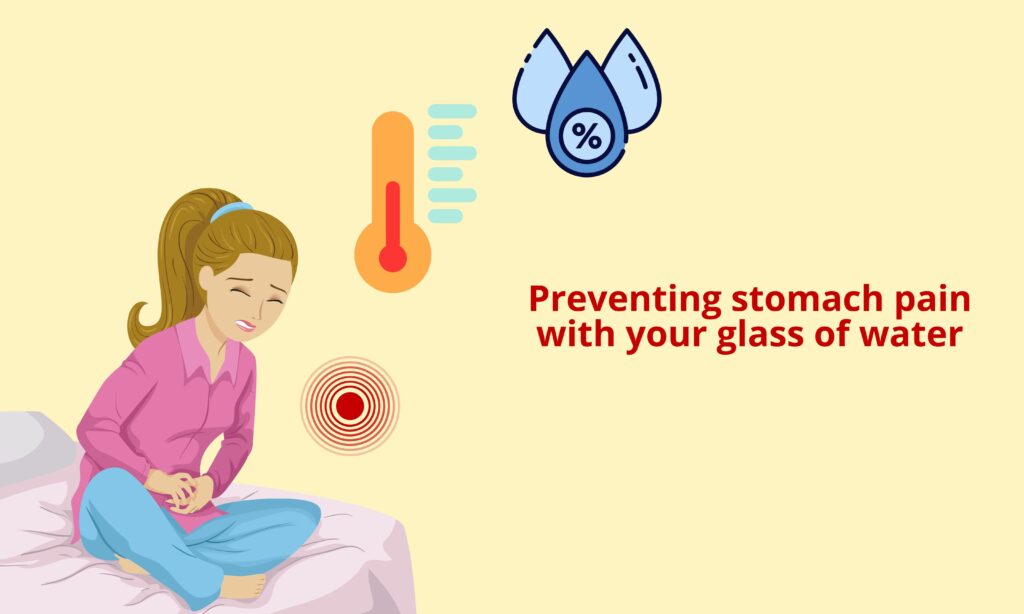
Many people experience a sharp pain or discomfort when drinking water on an empty stomach, and this can be a cause of concern for many. There are several reasons why this may occur, and it’s important to understand the underlying cause in order to address the issue.
One possible reason why drinking water on an empty stomach can hurt is due to the presence of acid in the stomach. When there is no food in the stomach to absorb the acid, it can cause irritation and inflammation of the stomach lining, resulting in discomfort and pain. This condition is known as acid reflux or gastroesophageal reflux disease (GERD).
Another possible cause of pain when drinking water on an empty stomach is related to the sensitivity of the stomach lining. Some people may have a more sensitive stomach lining, which can cause pain and discomfort when exposed to water or other substances. This can be exacerbated by factors such as stress, anxiety, and certain medications.
Dehydration is another possible cause of discomfort when drinking water on an empty stomach. When the body is dehydrated, the stomach lining may become dry and more susceptible to irritation and inflammation. This can lead to pain and discomfort when drinking water, especially if the water is cold.
In some cases, the pain or discomfort when drinking water on an empty stomach may be related to an underlying medical condition. For example, conditions such as gastritis, peptic ulcer disease, or irritable bowel syndrome (IBS) can cause pain and discomfort in the stomach, especially when exposed to certain triggers.
If you experience pain or discomfort when drinking water on an empty stomach, it’s important to speak with your healthcare provider to determine the underlying cause and appropriate treatment options. Treatment may include lifestyle changes such as avoiding triggers, managing stress, and staying hydrated, as well as medication or other medical interventions as needed.
In summary, pain or discomfort when drinking water on an empty stomach can be caused by a variety of factors, including acid reflux, sensitivity of the stomach lining, dehydration, or an underlying medical condition. By working with your healthcare provider and making appropriate lifestyle changes, you can manage your symptoms and improve your overall well-being.
Why does my stomach hurt when I drink water?

If you experience stomach pain or discomfort when drinking water, you may be wondering why this is happening. There are several reasons why this can occur, and it’s important to understand the underlying cause in order to address the issue.
- One possible reason why drinking water can cause stomach pain is related to the temperature of the water. When cold water is consumed, it can cause the muscles in the stomach to contract, leading to cramping and discomfort. This can be particularly problematic when drinking a large amount of cold water on an empty stomach.
- Another possible cause of stomach pain when drinking water is related to the pH balance of the stomach. When there is an imbalance in the levels of acid and alkaline in the stomach, it can cause pain and discomfort, particularly when water or other substances are introduced. This can be exacerbated by factors such as stress, anxiety, and certain medications.
- In some cases, the pain or discomfort when drinking water may be related to an underlying medical condition. For example, conditions such as gastritis, peptic ulcer disease, or gastroesophageal reflux disease (GERD) can cause pain and discomfort in the stomach, especially when exposed to certain triggers.
- Dehydration is another possible cause of stomach pain when drinking water. When the body is dehydrated, the stomach lining may become dry and more susceptible to irritation and inflammation. This can lead to pain and discomfort when drinking water, especially if the water is cold.
If you experience stomach pain or discomfort when drinking water, it’s important to speak with your healthcare provider to determine the underlying cause and appropriate treatment options. Treatment may include lifestyle changes such as avoiding triggers, managing stress, and staying hydrated, as well as medication or other medical interventions as needed.
In summary, stomach pain or discomfort when drinking water can be caused by a variety of factors, including the temperature of the water, the pH balance of the stomach, underlying medical conditions, and dehydration. By working with your healthcare provider and making appropriate lifestyle changes, you can manage your symptoms and improve your overall well-being.
What is acid reflux?
Acid reflux, also known as gastroesophageal reflux disease (GERD), is a condition where stomach acid and other contents flow back up into the esophagus, causing a burning sensation in the chest and throat. This can be a common and uncomfortable occurrence for many people, and understanding the underlying causes can help in managing the symptoms.
One of the most common causes of acid reflux is a weakened or malfunctioning lower esophageal sphincter (LES). The LES is a muscular valve that separates the esophagus from the stomach, and it normally closes tightly to prevent stomach acid from flowing back up into the esophagus. However, when the LES is weakened or doesn’t function properly, stomach acid can flow back up into the esophagus, causing irritation and discomfort.
Other factors that can contribute to acid reflux include certain types of foods and drinks, such as caffeine, alcohol, spicy or fatty foods, and acidic foods like citrus fruits and tomatoes. Eating large meals or lying down after eating can also increase the likelihood of experiencing acid reflux symptoms.
Drinking water on an empty stomach can also contribute to acid reflux symptoms, as it can dilute the stomach acid and lead to a feeling of fullness, causing the LES to relax and allowing stomach contents to flow back up into the esophagus.
There are several lifestyle changes and treatments that can help manage acid reflux symptoms. Avoiding triggers like certain foods and drinks, eating smaller meals more frequently, and avoiding lying down immediately after eating can all be helpful in reducing symptoms. Over-the-counter antacids and other medications can also provide relief, as well as prescription medications like proton pump inhibitors (PPIs) and H2 blockers.
In more severe cases, surgery may be necessary to repair or strengthen the LES and prevent stomach acid from flowing back up into the esophagus.
In conclusion, acid reflux is a condition where stomach acid and other contents flow back up into the esophagus, causing discomfort and irritation. Understanding the underlying causes, including a weakened LES and certain foods and drinks, can help in managing symptoms. Making lifestyle changes and seeking medical treatment when necessary can provide relief and improve overall quality of life.
Preventing stomach pain with your glass of water

Drinking water is essential for staying hydrated and maintaining optimal health, but for some people, it can cause stomach pain and discomfort, especially when consumed on an empty stomach. However, there are several strategies that can help prevent stomach pain and discomfort when drinking water.
Temperature
One of the most important things to consider is the temperature of the water. Cold water can cause the muscles of the stomach to contract, leading to cramps and discomfort. Instead, try drinking room temperature or warm water, which can help relax the muscles and prevent pain.
Water consumption
Another factor to consider is the timing of your water consumption. Drinking water on an empty stomach can dilute stomach acid and lead to acid reflux symptoms, causing discomfort and pain. It’s important to drink water with meals or after meals to avoid this issue.
Additionally, it’s important to stay hydrated throughout the day, rather than consuming large amounts of water all at once. Drinking small amounts of water frequently throughout the day can help prevent stomach pain and discomfort.
In some cases, certain foods and drinks may exacerbate stomach pain and discomfort when drinking water. Foods high in fat, spice, or acid can irritate the stomach lining and increase the likelihood of experiencing pain or discomfort. Similarly, caffeine and alcohol can also irritate the stomach lining and lead to pain.
If you are experiencing frequent stomach pain and discomfort when drinking water, it’s important to talk to your healthcare provider to rule out any underlying medical conditions, such as acid reflux or gastrointestinal disorders.
In conclusion, drinking water is important for maintaining optimal health, but it’s important to consider factors like temperature, timing, and frequency to prevent stomach pain and discomfort. Avoiding certain foods and drinks and seeking medical attention if necessary can also help improve overall digestive health.
Conclusion
In conclusion, experiencing stomach pain when drinking water on an empty stomach can be a frustrating and uncomfortable issue for many individuals. However, there are several strategies that can help prevent this discomfort and improve overall digestive health.
It’s important to consider the temperature of the water, as cold water can cause stomach muscles to contract and lead to pain. Drinking water with meals or after meals can also help prevent stomach pain and discomfort by avoiding the dilution of stomach acid.
Staying hydrated throughout the day with small, frequent sips of water can also prevent discomfort. Additionally, avoiding foods and drinks that can irritate the stomach lining, such as those high in fat, spice, acid, caffeine, and alcohol, can improve overall digestive health.
If stomach pain and discomfort persist despite these strategies, it’s important to seek medical attention to rule out any underlying medical conditions, such as acid reflux or gastrointestinal disorders.
Overall, by being mindful of the timing, temperature, and frequency of water consumption and making healthy choices when it comes to diet and lifestyle, individuals can prevent stomach pain and discomfort and promote optimal digestive health.